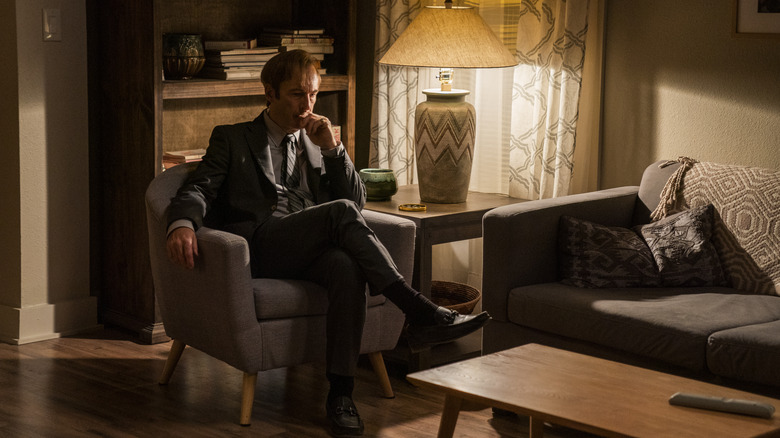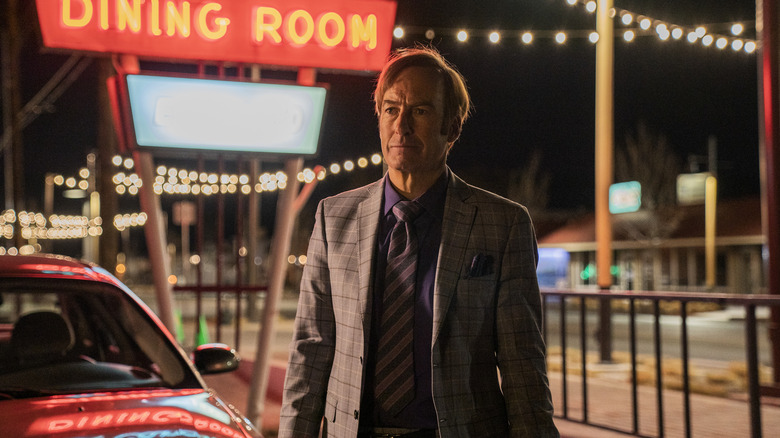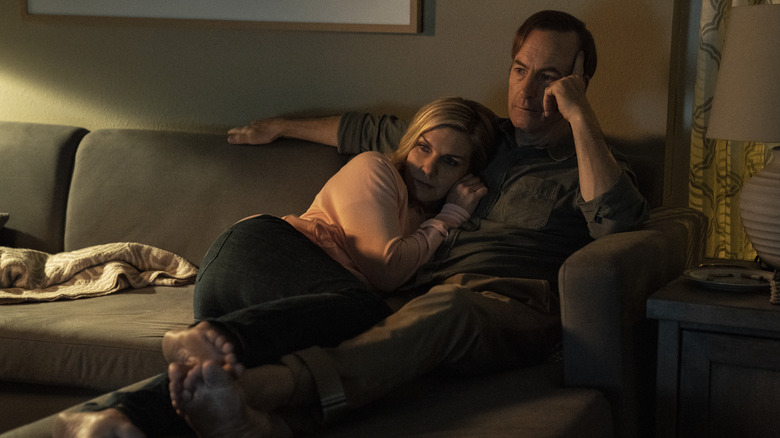Could The Better Call Saul Finale Give Jimmy A Happy Ending?
This post contains spoilers for the latest episode of "Better Call Saul."
It's the ultimate question about storytelling: Is it about the journey, or the destination? "Breaking Bad" made a compelling argument in support of the former, taking viewers through five incredibly patient seasons and carefully documenting the epic fall of Walter White (Bryan Cranston) along with all the unfortunates caught in his wake. The prequel/spin-off series "Better Call Saul," meanwhile, simply wouldn't exist without our foreknowledge of what must happen to Jimmy McGill/Saul Goodman in order to bring things in line with his initial appearance in the original series. It's all about the destination — though the writers have emphatically proven the difference between knowing what happens versus finding out how it all goes down.
With only a handful of episodes remaining before the series finale, "Better Call Saul" will surely provide answers to many of the fanbase's most pressing questions that remain: with Lalo Salamanca (Tony Dalton) shockingly out of the picture, who (if anyone) will step up to fill that gaping antagonistic void? Will Kim Wexler (the Emmy-nominated Rhea Seehorn) turn out okay? And perhaps most importantly, how will the show wrap up those black-and-white flashforwards depicting a post-"Breaking Bad" Jimmy, living under the pseudonym Gene Takovic?
That last point could be resolved in any number of tragic, heartbreaking ways ... but what if the writers opt for another approach altogether? Could Slippin' Jimmy actually be fated for somewhat of a happy ending? As difficult as that may be to believe, star Bob Odenkirk's latest comments just might hint at that possibility.
Jimmy's choices
"Breaking Bad" famously ended with something of a Pyrrhic victory for its main leads. Jesse Pinkman (Aaron Paul), subjected to more pain and trauma than perhaps any fictional character this side of Benjamin Linus on "Lost," was granted a bittersweet ending as he sped away into the night (later expanded upon in "El Camino"). Walter White himself basically got everything he wanted — fame and recognition — though at the cost of everyone he ever loved and, of course, his own life.
What does "Better Call Saul" have in the cards for the characters we've been following for so long? In an interview with The New York Times, Bob Odenkirk gave his thoughts on portraying Jimmy in these latter stages of his transformation into Saul and, intriguingly, how that's handled in the finale:
"I've always felt that Jimmy had a very high emotional intelligence, but he didn't get to apply that to himself. 'Who am I?' and 'What am I doing?' and 'Why have I done what I've done?' I feel like he's always hidden and run from that kind of thinking. I think my favorite thing about this season is that they grant him the opportunity to do that. In the finale, without getting into it at all specifically, he does get that self awareness and I really appreciate that. Playing him was hard at times because of the way he refused to examine his own choices."
Odenkirk doesn't give away any specifics, of course, but the subtext between the lines of this quote might very well point towards how this wonderfully complex figure ultimately wraps up his arc.
All's well that ends well?
I struggle to think of a greater accomplishment in all of "Better Call Saul" than the added layers of depth granted to someone who only ever seemed like a caricature on "Breaking Bad." Routinely depicted as a brash, shallow, and oftentimes cowardly lowlife when in the persona of Saul Goodman, Jimmy McGill dramatically flips that dynamic on its head and retroactively grants a layer of tragedy to the fallen figure that he'll eventually become. Despite his obvious vices, the generally well-intentioned Jimmy still remains caring, well-intentioned, and extraordinarily clever (convincing Lalo to send Kim in his stead rather than leaving her alone with Salamanca in their apartment likely saved her life).
But as Odenkirk suggests in the above quote, Jimmy's inability to perform any actual introspection into his actions has always held him back ... until the finale, apparently. Granted, it's difficult to tell when exactly the actor was able to dive into that aspect of the character. Is it the present-day storyline, which is still set years before the events of "Breaking Bad"? Does it happen during the "Breaking Bad" timeline, which could be when Walt and Jesse show up as well? Or, as alluded to earlier, is Odenkirk talking about those Nebraska-set Gene scenes set in the aftermath of Walt burning everything to the ground?
If it's the latter, perhaps that self-awareness manifests during one last reunion with Kim (who, remember, grew up in Nebraska). But could Jimmy possibly be redeemable by then? After the role he played in Howard Hamlin's (Patrick Fabian) murder and all the monstrous things he does in "Breaking Bad," does he even deserve a happy ending? Well, we have five episodes left to find out.
New episodes of "Better Call Saul" airs on AMC every Monday.


